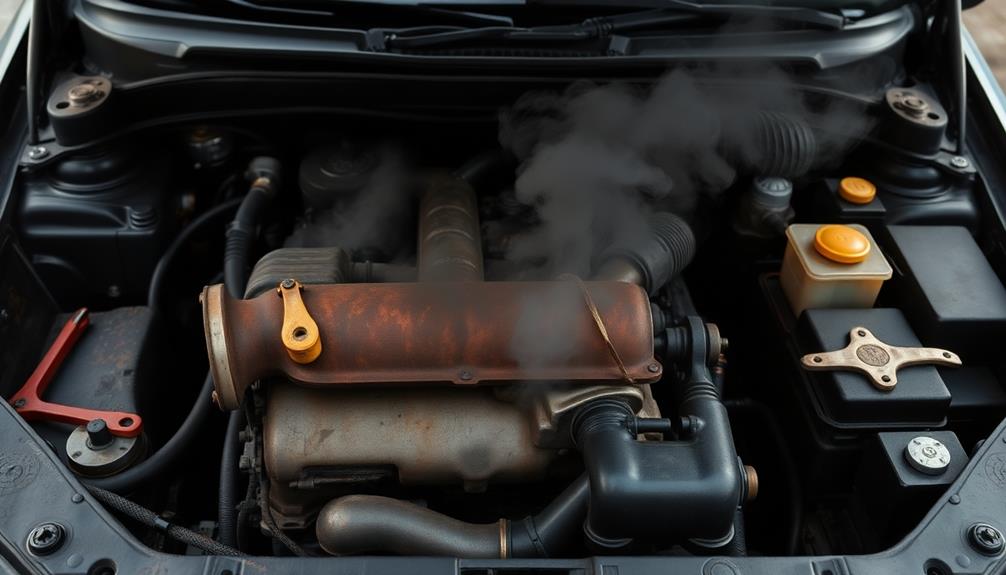If you notice a bad smell coming from your car, it might be your catalytic converter acting up. You'd likely smell something like rotten eggs, which happens when it can't properly convert harmful gases. This sulfur odor signals a problem that needs your attention. If you're catching a whiff of unburned gasoline, that's another red flag! Ignoring these smells can lead to serious vehicle issues, impacting performance and even your safety. So, if you're curious about what steps to take next, there's plenty more helpful information coming your way!
Key Takeaways
- A bad catalytic converter often emits a rotten egg odor due to sulfur compounds failing to convert hydrogen sulfide.
- The presence of a gasoline scent indicates unburned fuel, resulting from a rich air/fuel mixture.
- Dark smoke from the exhaust can signal catalytic converter malfunction, often accompanied by a persistent foul smell.
- Overheating issues can heighten the sulfur odor, indicating deeper problems within the exhaust system.
- Ignoring these smells can lead to decreased engine performance, increased emissions, and potential health risks from harmful gases.
Introduction

Detecting a bad catalytic converter can be crucial for maintaining your vehicle's performance and emissions standards. If you're driving around and notice a strange smell, especially a rotten egg odor, pay attention! This smell typically means your catalytic converter isn't working properly. A healthy catalytic converter helps turn harmful gases into safer emissions, but if it fails, it may produce that sulfur smell you can't ignore.
Additionally, just like maintaining a healthy lifestyle is important for overall well-being, ensuring your vehicle runs efficiently is key for longevity. Regular check-ups can help avoid significant issues down the road, just as regular check-ups are important for monitoring health.
Alongside the rotten egg smell, you might also see dark smoke coming from your exhaust. This darker-than-normal exhaust is a sign that things aren't right. If you notice both the smell and smoke, it's time to take action.
And don't forget about the check engine light—it can be a helpful warning! If it lights up with those funky smells, it's your vehicle's way of saying, "Hey, something's off!"
Taking these signs seriously can help prevent more significant problems down the road. So, if you catch a whiff of that rotten egg smell or see that pesky check engine light, it's best to investigate further. Your car—and your wallet—will thank you!
Description of the Smell
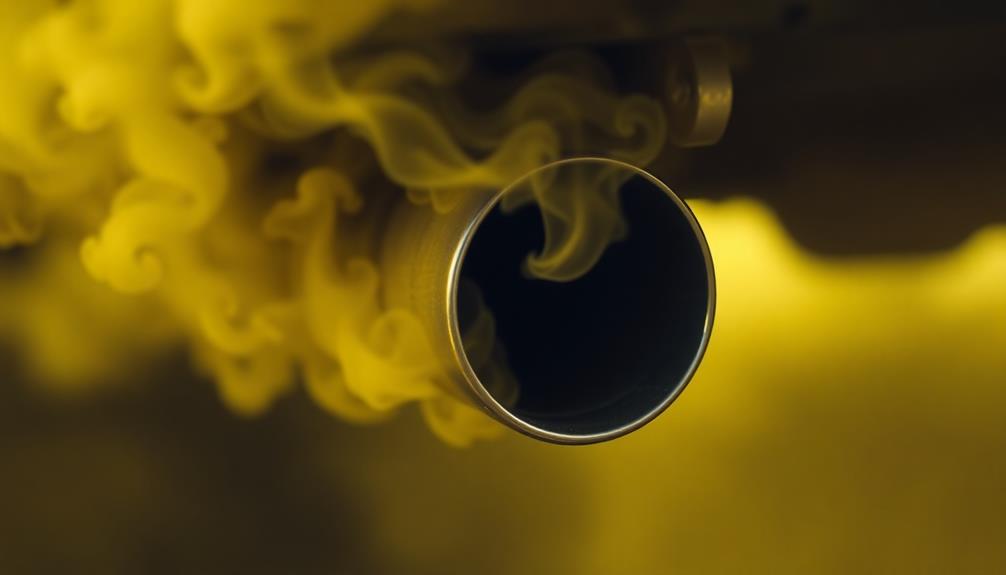
When you encounter a bad catalytic converter, the smell can be unmistakable. You might notice a strong, rotten egg odor wafting from your exhaust. This smell comes from sulfur compounds that a faulty catalytic converter fails to convert into odorless gases. It's like a warning signal that something's not right under the hood!
Ensuring proper ventilation in your vehicle, much like maintaining a wood stove, can help prevent dangerous gas buildup. Additionally, compliance with safety standards in your vehicle's exhaust system is crucial for optimal operation, similar to the safety regulations important for wood stove operation.
Alongside that rotten smell, you may also detect a gasoline scent. This happens when unburned fuel is present in the exhaust, indicating that the air/fuel mixture is too rich. If you see darker-than-normal exhaust smoke, it's another sign that your catalytic converter is struggling to do its job.
Keep an eye out for that check engine light, too! It often illuminates when these unpleasant smells are present, serving as an early warning sign of potential catalytic converter issues.
If you notice any of these odors, it's essential to address the problem promptly. Ignoring these warning signs can lead to more significant issues down the road. So, trust your nose, and don't hesitate to seek help if you detect these foul smells coming from your vehicle!
Source and Composition
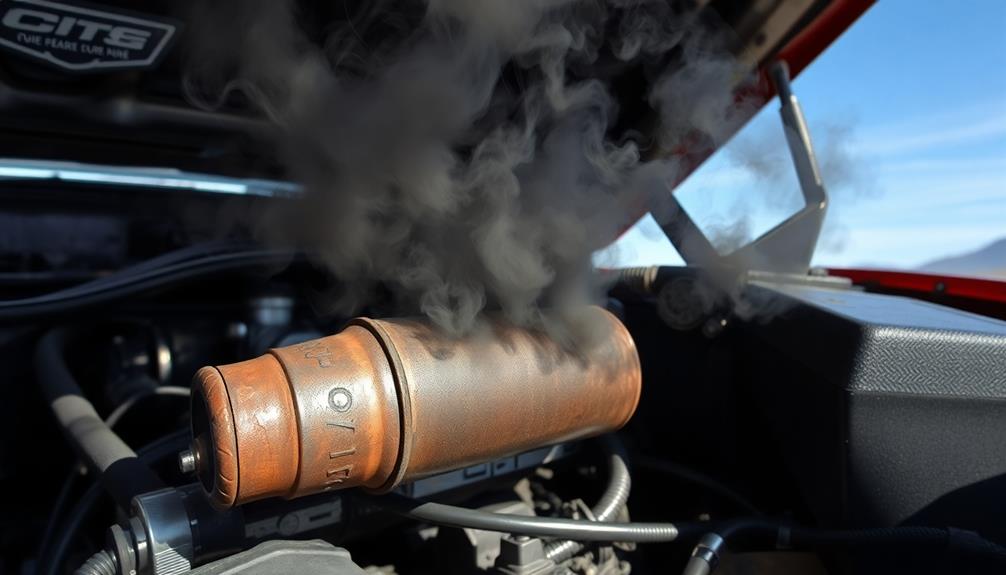
A bad catalytic converter often has its roots in the chemical processes that take place within it. When it's functioning properly, the catalytic converter transforms harmful gases into safer ones. However, if it fails, you might notice a distinct smell of rotten eggs. This odor comes from hydrogen sulfide that isn't being converted into odorless sulfur dioxide.
Regular maintenance of your vehicle's exhaust system can help prevent such issues from arising, much like consistent maintenance is essential for optimal performance of air purifiers.
If your catalytic converter is overheating or contaminated, the sulfur smell can get even stronger, pointing to a failure in filtering harmful exhaust compounds. But that's not all! You might also catch a whiff of gasoline. This happens when unburned fuel sneaks into the exhaust system, leading to unwanted backfires.
You should also keep an eye on darker-than-normal exhaust smoke. This could be another sign that your exhaust system isn't working as it should.
While new catalytic converters may give off temporary odors during their break-in period, persistent foul smells are usually a sign of deeper issues. If you ever experience these smells, it's best to get your vehicle checked out to avoid further problems.
Typical Scenarios or Environments
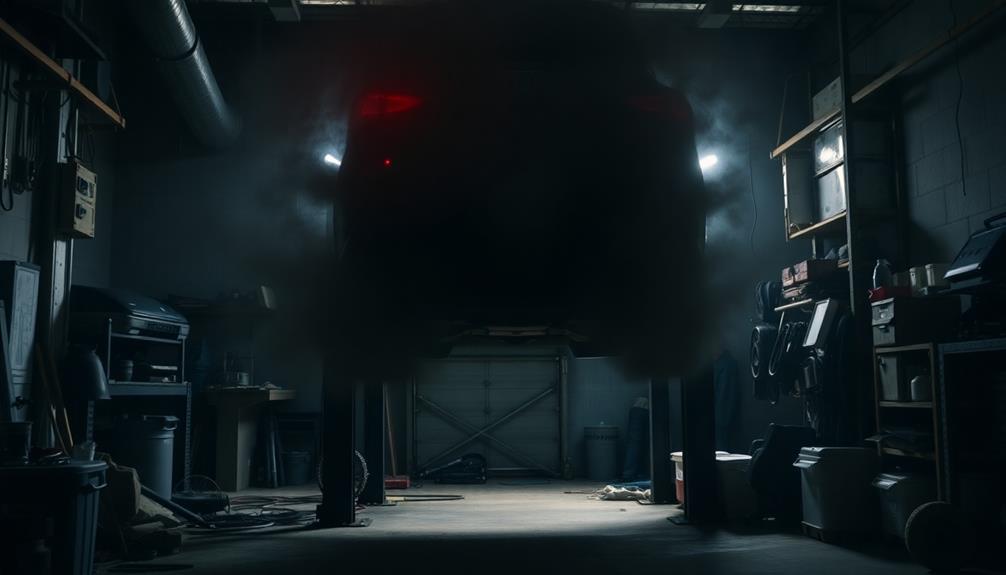
Experiencing the foul odors associated with a bad catalytic converter often happens in specific scenarios or environments.
For instance, if you notice a rotten egg smell, that's a sign your catalytic converter might be failing. This sulfur odor means harmful compounds, like sulfur dioxide, are escaping due to unburned fuel.
You might also catch a whiff of gasoline in your car's cabin. This occurs when the air/fuel mixture is too rich, leading to unburned gasoline entering the exhaust.
If you're driving and smell smoky exhaust, an exhaust leak could be to blame, allowing those gases to escape and potentially fill your cabin with unpleasant fumes.
New catalytic converters can produce a burning plastic smell during their break-in period, but if that scent sticks around, it could mean overheating or internal damage.
Plus, if your check engine light turns on, it's usually a warning sign that something's wrong with your exhaust system, which could lead to those nasty smells.
Emotional or Cultural Associations

The smell of a failing catalytic converter can stir up strong emotional reactions, often leaving you feeling uneasy and concerned. When you catch a whiff of that sulfur odor, which many liken to rotten eggs, it's hard not to feel a wave of discomfort. This unpleasant smell not only signals possible damage to the catalytic converter but also brings to mind pollution and environmental neglect.
Culturally, foul odors, like those from a bad catalytic converter, symbolize deeper issues with your vehicle. They trigger a sense of urgency, making you want to rush to automotive technicians for help. You might find yourself prioritizing vehicle maintenance, driven by a desire for peace of mind.
These strong scents remind us that our cars are like living beings, needing care to function properly. Your reaction to that smell reinforces the belief that it's a sign of something wrong, urging you to pay attention.
Health or Safety Considerations
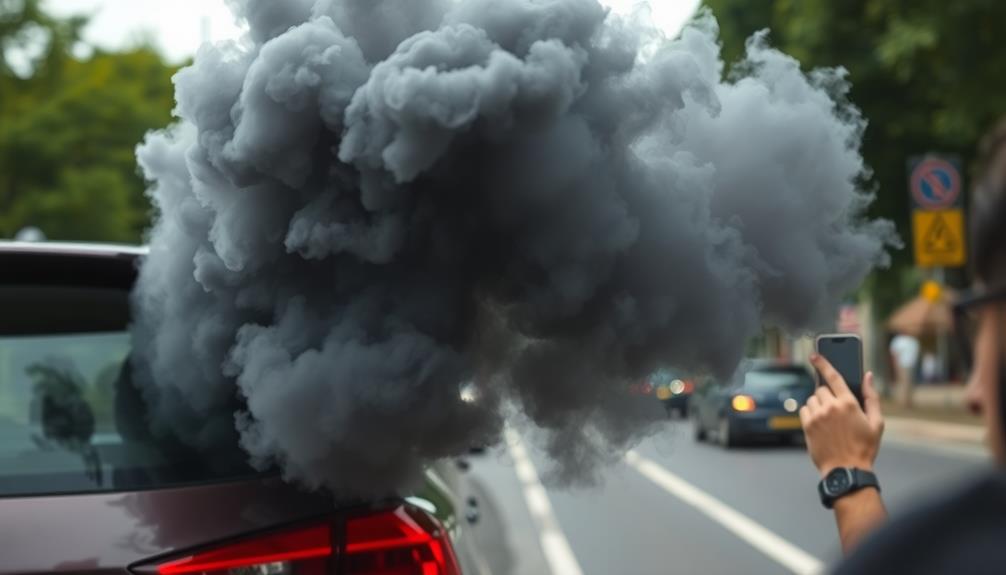
Health and safety concerns spring to mind when dealing with a failing catalytic converter. If you notice a rotten egg smell, that's a sign of harmful gases like sulfur dioxide escaping. This can lead to health risks, especially for those with asthma or other respiratory issues. You don't want to breathe in those fumes!
Prolonged exposure to exhaust from a malfunctioning converter can be serious. Carbon monoxide, a dangerous gas, can sneak into your vehicle, posing life-threatening risks. This is why regular vehicle maintenance is so important. By checking your catalytic converter, you can catch problems early and protect your health.
If there's an exhaust leak, those toxic vapors might enter the cabin, making the situation even worse. It's crucial to pay attention to any unusual smells or drops in performance. Don't hesitate to get your vehicle checked out.
Taking care of your car isn't just about keeping it running smoothly; it's about ensuring the safety of you and your passengers. So, keep an eye (and nose) out for those signs, and take action when needed! Your health is worth it.
Final Thoughts

A failing catalytic converter can lead to significant issues if not addressed promptly.
If you smell a rotten egg odor, it's a sign that your catalytic converter is struggling to process exhaust gases efficiently. This smell often indicates a rich fuel mixture, meaning unburned gasoline is making its way into the exhaust system. Ignoring these warning signs can hurt your engine's performance and fuel efficiency, and you might even fail emissions tests!
If you notice a burning plastic smell alongside the sulfur odor, don't ignore it! This could mean there are more problems with your catalytic converter or nearby components.
To avoid costly repairs down the line, pay attention to these smells and get your car checked out by a trained technician. Regular maintenance can help keep your catalytic converter and entire exhaust system in good shape.
Frequently Asked Questions
What Does a Clogged Catalytic Converter Smell Like?
When a catalytic converter's clogged, you'll notice a strong sulfur smell, often likened to rotten eggs. You might also detect a gasoline odor and see darker exhaust smoke, indicating incomplete combustion and potential engine issues.
What Are Three Signs of a Bad Catalytic Converter?
You'll notice three signs of a bad catalytic converter: an illuminated check engine light, reduced engine performance, and a rattling noise. Address these issues promptly to avoid further damage to your vehicle's exhaust system.
Can You Drive With a Smelly Catalytic Converter?
You can drive with a smelly catalytic converter for short distances, but it's risky. Ignoring the odor can lead to severe engine damage and increased repair costs. It's best to address the issue promptly.
What Does a Bad Cat Smell Like?
When your catalytic converter's failing, you might notice a rotten egg smell or gasoline odor. These unpleasant scents indicate it's not processing emissions properly, so you should definitely get your vehicle checked out soon.
